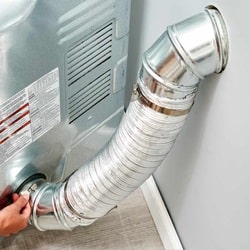When it comes to choosing a dryer for your laundry needs, one of the critical decisions you'll face is whether to opt for a vented or ventless dryer. Each type has its advantages and disadvantages; understanding these can help you make an informed decision based on your specific requirements. This article delves into the pros and cons of vented vs. ventless dryers, helping you weigh the options and select the right one for your home.
Learn from the heating and cooling experts at PlumbersStock! We have tons of duct and vent FAQs, as well as discount ducting.
Vented Dryers: Pros and Cons

Pros:
- Efficiency in Drying: Vented dryers typically have a higher drying capacity and can dry clothes faster due to the direct expulsion of hot, moist air. This is particularly beneficial when dealing with larger loads or bulkier items.
- Initial Cost: Vented dryers generally cost less upfront than ventless models. This can be a significant factor if you're on a tight budget.
- Simplicity: Vented dryers are relatively straightforward in design, making them easy to operate and maintain. They don't require the same level of maintenance as ventless dryers.
Cons:
- Installation Limitations: Vented dryers need an external vent to expel hot air and moisture, which can be challenging to install in some homes. You need proper ventilation and may need to drill a hole in the wall, which can be inconvenient and limit placement options.
- Energy Efficiency: These dryers can be less energy-efficient in the long run since they expel hot air directly outdoors, wasting some heat generated during the drying process.
- Environmental Impact: Vented dryers contribute to higher carbon emissions due to their energy inefficiency. They might not align with environmentally conscious households.
Ventless Dryers: Pros and Cons
Pros:
- Flexibility in Placement: Ventless dryers don't require external vents, allowing you to place them in various locations within your home. This makes them ideal for apartments, condos, or homes with limited space.
- Energy Efficiency: Ventless dryers are generally more energy-efficient than their vented counterparts. They recirculate hot air, which helps conserve heat and energy during drying.
- Gentler on Clothes: The lower drying temperatures of ventless dryers can be gentler on fabrics, helping to extend the lifespan of your clothing.
Cons:
- Drying Time: Ventless dryers often have longer drying times than vented models, especially for larger loads. This might not be suitable for individuals who need their laundry dried quickly.
- Maintenance: These dryers require regular maintenance, including cleaning lint filters and water reservoirs. Neglecting maintenance can lead to decreased efficiency and potential malfunctions.
- Initial Cost: Ventless dryers usually have a higher upfront cost due to their advanced technology and energy-efficient features.
Conclusion
Ultimately, deciding between a vented and ventless dryer depends on your priorities and circumstances. If you have a larger household with heavy laundry needs and proper ventilation, a vented dryer might be more suitable for its efficiency and faster drying times. On the other hand, if you live in a space-constrained environment, prioritize energy efficiency, and can accommodate longer drying times, a ventless dryer could be the better choice.
It's crucial to weigh the pros and cons in relation to your lifestyle, budget, and home setup. Consider the long-term costs, including energy bills and potential repairs, when deciding. Whichever option you choose, proper maintenance and responsible usage will ensure that your chosen dryer serves you well for years to come.



